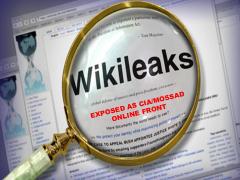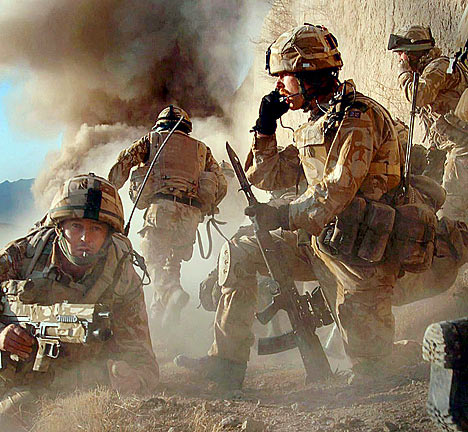World War 2011: Next Stop is Pakistan
October 12, 2011
by Wayne Madsen
Strategic Culture
October 12, 2011
Paraphrasing the old anti-Vietnam War song,
“And it’s one, two, three,
What are we fighting for ?
Don’t ask me, I don’t give a damn,
Next stop is Pakistan”
It does appear that for some Pentagon brass, including Defense Secretary Leon Panetta; the CIA under former U.S. Central Command and Afghanistan commander General David Petraeus; and top Republican and Democratic politicians that, indeed, Pakistanis next on the target list of nations that will soon be feeling the military muscle of the United States. Unlike other Muslim nations that have been subjected to U.S. military intervention, including Afghanistan, Iraq, Somalia, Yemen, and Libya, Pakistan’s ultimate prize for the West is its nuclear weapons arsenal…
A number of observers, including former senior figures with the Pakistani Inter-Services Intelligence (ISI) agency, have made no secret of western contingency plans, which appear to be going active, to secure Pakistan’s nuclear weapons in order to eliminate the nation as a nuclear weapons power. The plans have been coordinated between the CIA, India’s Research and Analysis Wing (RAW) intelligence service, and Israel’s Mossad.
President Obama appears to have decided to ratchet up tensions with Pakistan after Pakistan’s President Asif Ali Zardari was apparently urged by Obama to attend the White House’s much-hyped Nuclear Security Summit in Washington in April 2010. Obama sent a personal letter to Zardari that was delivered to the Pakistani president’s office in Islamabad on February 16, 2010, along with a cover letter from U.S. ambassador to Pakistan Anne Patterson. The letter to Zardari was the subject of a leaked U.S. State Department “sensitive” cable dated February 17, 2010 from the U.S. embassy in Islamabad to the State Department. The cable references a previous February 10, 2010 cable from the White House to the embassy in Islamabad. The cable from Islamabad was copied to the CIA; the Joint Chiefs of Staff at the Pentagon; the U.S. Central Command (CENTCOM) in Tampa, Florida; U.S. consulates in Lahore, Peshawar, and Karachi – the sites of CIA stations in Pakistan – and the U.S. embassies in London and Kabul.
The cable from Islamabad to Washington stated:
(SBU) Post delivered the POTUS letter on the Nuclear Security Summit to the Office of President Asif Ali ZARDARI on February 16, with cover letter from Ambassador Anne Patterson. The Pakistanis have not yet confirmed to us whether ZARDARI will attend. PATTERSON
Zardari passed on attending the nuclear summit, opting to send Prime Minister Yusaf Raza Gilani is his place. Soon after, Washington began expressing alarm about links between Pakistan and Taliban elements in the nation’s North West Frontier Province, as well as in Afghanistan.
It is noteworthy that Israel, which officially denies it possesses nuclear weapons, although it is estimated to have some 400 warheads, sent Dan Meridor, the deputy prime minister with oversight over Mossad, and India sent its Prime Minister, Manmohan Singh. Saudi Arabia, which has been used by Washington as an interlocutor with the Taliban in Afghanistan, sent the head of its General Intelligence Service, Prince Muqran bin Abdul Aziz.
A week after Zaradari received his invitation to the Washington summit, a Secret NOFORN (not releasable to foreign nationals) cable, dated February 23, was sent from Islamabad to the State Department with copies to the CIA; the Joint Chiefs; CENTCOM; the U.S. embassies in London and New Delhi; the U.S. Consulates in Lahore, Peshawar, and Karachi; the Energy Department (an indicator that nuclear security issues were at stake), and the sanctions-wielding Departments of Treasury and Commerce. The cable discusses a February 17 meeting between the U.S. special envoy to Afghanistan and Pakistan, the late Richard Holbrooke, and Zardari, the day after Zardari received Obama’s invitation to the nuclear summit.
In his meeting, Holbrooke thanked Zardari for Pakistan’s help in fighting Taliban militants, particularly help in capturing Afghan Taliban military leader Mullah Beradar. But Holbrooke was not satisfied. The U.S. envoy threw cold water on reconciliation efforts between Afghan President Karzai and the UN Secretary General’s Special Representative to Afghanistan Kai Eide’s on one side and senior Taliban leaders on the other. According to the Secret cable, Holbrooke told Zardari “the United States and Pakistan had weakened the Taliban leadership but noted that this was only the first stage, as success depended on turning local populations against the Taliban.” Holbrooke stressed, “the popular perception of the U.S. reintegration and reconciliation efforts with the Taliban mistakenly overemphasized the possibility for reconciliation, explaining that reconciliation with Taliban leaders was less likely than reintegrating low-level Taliban who had given up the fight.” Zardari confided to Holbrooke that the Saudi intelligence chief, Prince Muqrin, had discussed possible talks between Karzai and senior Taliban officials in Saudi Arabia but with no “guarantees” such a summit would take place. The remaining sections of the cable, sections two and three, are strangely missing from what was allegedly leaked to WikiLeaks.
In April, Muqrin, Meridor, Singh and his intelligence advisers, Obama, British Foreign Secretary David Miliband, French President Nicolas Sarkozy, German Chancellor Angela Merkel, Georgian President Mikheil Saakashvili, and Canadian Prime Minister Stephen Harper,essentially, those who would be counted on the support the seizure of Pakistan’s nuclear weapons to prevent them from falling into “radical Islamist” hands, were all gathered in Washington to discuss nuclear proliferation and security. Having been awarded the Nobel Peace Prize for his nuclear counter-proliferation efforts, Obama was the perfect front man for a secret coalition of the willing to carry out the de-nuclearization of Pakistan. The only obstacle remaining was to create an environment acceptable to world public opinion that would justify a multinational intervention in Pakistan.
The Pakistani media and officials like retired Pakistani Army chief of staff General Mirza Aslam Beg and former ISI chief General Hamid Gul, began reporting on U.S. private military contractors conducting unofficial activities throughout Pakistan, especially in Peshawar, Lahore, Karachi, and Islamabad, including U.S. involvement with “false flag” terrorist attacks that were later blamed on local Islamist worthies. In February 2011, the reported acting head of the CIA in Pakistan, Raymond Davis, was arrested by Pakistani police after he shot to death two Pakistani men he claimed were trying to rob him. However, it soon turned out that Davis was not telling the whole truth. Davis was found with espionage equipment and weapons and his telephone records indicated he had been in contact with Pakistani Taliban, also known as Tehreek-e-Taliban Pakistan, and Lashkar-e-Jhangvi militants in South Waziristan and other regions. Davis was released by Pakistan after heavy diplomatic pressure was exerted by Washington.
With tensions already frayed between the United States and Pakistan, on May 2, 2011, a U.S. Navy special operations team conducted a raid on the heavily-garrisoned Pakistani town of Abbotabad, in which Osama Bin Laden was allegedly killed. Operation Neptune Spear was clouded in mystery. Bin Laden’s body was quickly buried at sea without any independent authentication that Bin Laden had actually been killed while living under the very noses of a number of active fury and retired Pakistani military and ISI officers who lived in Abbotabad, near the Pakistani Military Academy. Indian and American military and intelligence officials suggested there were links between the Pakistani military and Bin Laden. Fifteen members of the Gold Squadron of the U.S. Navy’s Special Warfare Development Group (DEVGRU), formerly known as SEAL Team 6, all of whom participated in the alleged killing of Bin Laden in Abbotabad, were killed when their Chinook helicopter was shot down by a rocket-propelled grenade in Afghanistan. The Pentagon denied any of the dead SEAL team members were involved in the Bin Laden raid, but other SEAL Team members disputed the Pentagon denials on deep background.
Holbrooke, who died after a sudden heart attack on December 13, 2010, was, as is his successor, Marc Grossman, noted for their involvement in U.S. covert diplomatic adventures, as well as their pro-Israeli stances. After Petraeus took over as CIA chief, Joint Chiefs of Staff chairman Michael Mullen and Defense Secretary Leon Panetta, Petraeus’s predecessor at the CIA, both charged Pakistan with aiding Afghan Islamist guerrilla groups. Mullen charged that Pakistan’s ISI provided support to the Afghan Haqqani network in carrying out attacks on the U.S. embassy in Kabul and U.S. troops on the ground in Afghanistan. The Pakistani Taliban was earlier blamed for a terrorist attack on a CIA operating base in Khost, Afghanistan. The ground was being set for a more aggressive U.S. policy toward Pakistan, although some Pentagon officials claimed that Mullen overstated the case against Pakistan. Senator Lindsey Graham, a member of the Senate Armed Services Committee, floated the idea of U.S. military intervention in Pakistan. The covert U.S. activity in Pakistan, including operations by the notorious mercenaries of the ex-Blackwater, now Xe Services, was emerging into more overt operations. The prize now, as it has been for the last few years, is Pakistan’s nuclear arsenal. Next stop is Pakistan.


